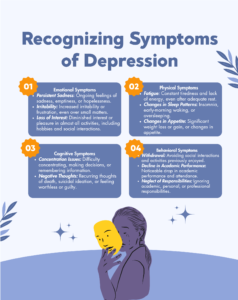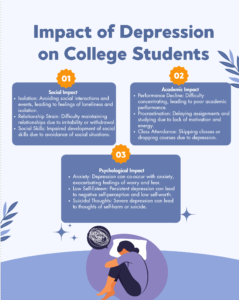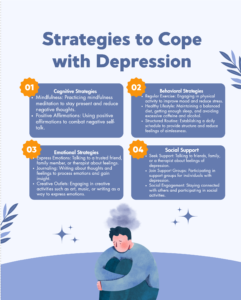Depression affects how you feel, the way you think, and how you act. It is characterized by persistent feelings of sadness, hopelessness, and a lack of interest or pleasure in activities once enjoyed. According to the American College Health Association, approximately 40% of college students reported feeling so depressed in the past year that it was difficult to function. Factors contributing to depression in college students include academic pressure, social challenges, financial stress, and the transition to independence.
Recognizing Symptoms of Depression
Emotional Symptoms
- Persistent Sadness: Ongoing feelings of sadness, emptiness, or hopelessness.
- Irritability: Increased irritability or frustration, even over small matters.
- Loss of Interest: Diminished interest or pleasure in almost all activities, including hobbies and social interactions.
Physical Symptoms
- Fatigue: Constant tiredness and lack of energy, even after adequate rest.
- Changes in Sleep Patterns: Insomnia, early-morning waking, or oversleeping.
- Changes in Appetite: Significant weight loss or gain, or changes in appetite.
Cognitive Symptoms
- Concentration Issues: Difficulty concentrating, making decisions, or remembering information.
- Negative Thoughts: Recurring thoughts of death, suicidal ideation, or feeling worthless or guilty.
Behavioral Symptoms
- Withdrawal: Avoiding social interactions and activities previously enjoyed.
- Decline in Academic Performance: Noticeable drop in academic performance and attendance.
- Neglect of Responsibilities: Ignoring academic, personal, or professional responsibilities.
Impact of Depression on College Students
Social Impact
- Isolation: Avoiding social interactions and events, leading to feelings of loneliness and isolation.
- Relationship Strain: Difficulty maintaining relationships due to irritability or withdrawal.
- Social Skills: Impaired development of social skills due to avoidance of social situations.
Academic Impact
- Performance Decline: Difficulty concentrating, leading to poor academic performance.
- Procrastination: Delaying assignments and studying due to lack of motivation and energy.
- Class Attendance: Skipping classes or dropping courses due to depression.
Psychological Impact
- Anxiety: Depression can co-occur with anxiety, exacerbating feelings of worry and fear.
- Low Self-Esteem: Persistent depression can lead to negative self-perception and low self-worth.
- Suicidal Thoughts: Severe depression can lead to thoughts of self-harm or suicide.
Strategies to Cope with Depression
Cognitive Strategies
- Mindfulness: Practicing mindfulness meditation to stay present and reduce negative thoughts.
- Positive Affirmations: Using positive affirmations to combat negative self-talk.
Behavioral Strategies
- Regular Exercise: Engaging in physical activity to improve mood and reduce stress.
- Healthy Lifestyle: Maintaining a balanced diet, getting enough sleep, and avoiding excessive caffeine and alcohol.
- Structured Routine: Establishing a daily schedule to provide structure and reduce feelings of aimlessness.
Emotional Strategies
- Express Emotions: Talking to a trusted friend, family member, or therapist about feelings.
- Journaling: Writing about thoughts and feelings to process emotions and gain insight.
- Creative Outlets: Engaging in creative activities such as art, music, or writing as a way to express emotions.
Social Support
- Seek Support: Talking to friends, family, or a therapist about feelings of depression.
- Join Support Groups: Participating in support groups for individuals with depression.
- Social Engagement: Staying connected with others and participating in social activities.



